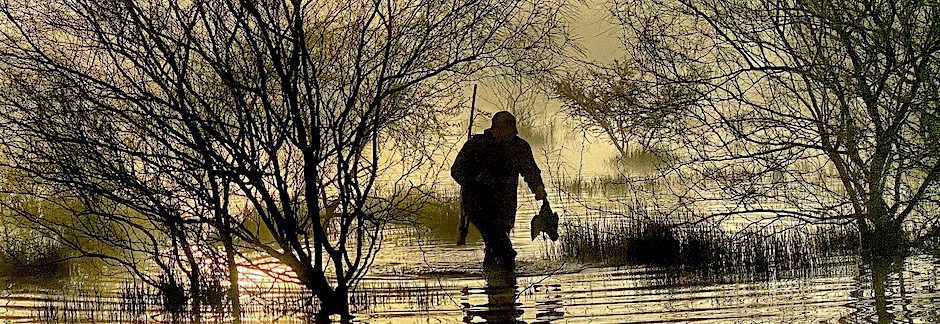MOJO’S Duck Season Somewhere Podcast
EP 490. Duck Hunter Satisfaction

“I want the biggest pile of dead ducks over the longest period of time,” implies the maximum sustained yield model by which North America’s waterfowl populations are managed. North America likely harvests more waterfowl than the rest of the world combined. But is it really what hunters want? To hear a few grumbling internet malcontents, you’d think maybe not–but what does the data say? Former Migratory Bird Chief Brad Border is back, discussing North American Waterfowl Management Goals and changes, measuring and managing hunter satisfaction, North America waterfowl harvest levels, maximum sustained yield–and consequences–duck hunter participation declines and implications, and much, much more! These hot-button topics are making the rounds. Listen, learn, let us know your thoughts.
EP 488. Mississippi Delta Supper Club Influences

For Chef David Crews, growing up in Mississippi’s Delta was inspiration enough. He describes how home-cooked meals and a his first part-time job while a teenager got him started. We talk about the unique Mississippi delta culture, the many iconic resturants located throughout this relatively remote area where folks don’t blink at an hour-plus drives down dusty turnrows to enjoy dinner, how hot tamales became a staple, the Delta Supper Club that attracted renowned chefs and out-of-state member patrons from throughout the United States, cooking on reality TV, and giving weekly cruise ship tourists a true taste of the Mississippi Delta. And when asked his personal favorite go-to comfort food? Well, I reckon that, too, goes back to his Delta roots.
EP 487. Long Point Ontario Diver Hunting

Mallards may be the so-called rockstars of the duck hunting universe, but not if you were born and raised on Long Point, Ontario, where massive diver rafts on Lake Erie form ravenous swarms that strafe your ice-encased layout rigs when the weather’s just right. And especially not if you’re a third-generation diver hunter and boat builder like Jayden Bankes, who excitedly describes bluebills, redheads, and king cans starved for lush wild celery beds so thick they bog outboards! Jayden takes us deep into his north-of-the-border duck hunting world, telling fascinating stories about the men, the ducks, the traditions and the legendary boats that forever shaped his big water world view. We should all be so lucky!
EP 486. Favoring Historic Arkansas Ecosystems as Waterfowl Habitat?

Five Oaks Ag Research and Education Center focuses it’s habitat management on Arkansas’s historic bottomland hardwood forest ecosystems, using the life history of mallards that have migrated there for eons as living proof of healthy habitat. Empasizing the whole bottomland ecosystem’s historic importance, Ryan Askren talks about moist-soil management, comparing it to conventional agricultural crops, listing the pros and cons, naming favored plant communities. We also get into bottomland hardwood management, why managing for early water and holding late water are absolutely essential, the hemi-marsh effect, and philopatric imprinting. Arkansas’s historic bottomland ecosystems attracted and sustained wintering mallards since time immemorial. And to hear Askren describe it, with similar management they will continue to do so.
EP 484. Rocky Leflore–The End of The Line Podcast

The man, the myth, the legend–the waterfowl podcast godfather and host of The End of the Line Podcast himself–Rocky Leflore pays a long overdue visit and catches up. Rocky’s in-depth interviews with waterfowl hunters culminated in popular, episodic series such as Redemption, The Warden, Becoming Martin, Mondays With Rob, The Innovator, Thunder Rolls, and many more, taking us deep behind the scenes. The Life’s Short GetDucks series brought me into the podcast world, and for that am thankful. The End of the Line Podcast ended abruptly during the pandemic–when you come to a fork in the road take it–but Rocky fills in lots of blanks, reminding us about who he was as a duck hunter and person, how he got into podcasting, why he left, what he enjoyed about it and misses most, what he learned, the challenges of converting a chatroom to social media, and more. He also provides an update about the famous Mossy Island story. It was great catching up with our old friend, and already looking forward to having him on again.
EP 483. Waterfowl Habitat Management: Rethinking “Seed Mentality” (Part 1)

As USDA Natural Resources Conservation Service’s Wildlife Biologist in the Mississippi Delta, Nelms has spent decades designing and developing numerous private-lands waterfowl impoundments. He’s worked extensively with private landowners throughout the region, improving desirable waterfowl habitat conditions, enhancing duck utilization, even putting together a handbook that’s considered a must-have staple for waterfowl habitat management (see related links below for your own PDF copy). Contact Kevin Nelms at kevin.nelms@USDA.gov.
**********
Related Links:
Wetlands Management for Waterfowl Handbook (PDF)
Managing Moist-Soil Impoundments (YouTube)
Other Need-to-Hear Habitat Episodes:
EP 125. Wetland Management for Waterfowl Habitat 1/3
EP 127. Wetland Management for Waterfowl 2/3
EP 129. Wetland Management for Waterfowl 3/3
EP 175. Wetlands Management for Waterfowl: Fall Considerations
EP 235. Waterfowl Habitat Management: Producing Desirable Moist-soil Vegetation
EP 237. Waterfowl Habitat Management: Controlling Problem Plants
EP 245. Waterfowl Habitat Management: Planting Agricultural Hot Crops
EP 254. Waterfowl Habitat Management: Good Intentions, Bad Ideas, Mismanagement
**********
EP 482. The Shotgun Conservationist

“How do I pay Mother Nature to make wild animals instead?” asks Brant McDuff from Brooklyn, New York, who grew up shooting shotguns, didn’t start hunting until recently, and is fervently spreading hunting gospel via speaking engagements, hunter’s ed courses and a fresh-off-the-press book. Yeah yeah, hunting is conservation. But coming from outside the cradle-to-grave hunting community, Brant brings fresh viewpoints to include venison diplomacy, preservation versus conservation, natural fiber versus synthetics, meat versus something else, virtue signaling versus land ethic, wildlife disturbances and rewilding nature from mountain cyclist/backpacker (I may have used the catchall word “granola”) as compared to hunters, social media representations, stigmatized words like trophy and hunting, and more. Ninety-six percent of Americans do not hunt. What now?
***********
Check out Brant McDuff’s book:
The Shotgun Conservationist: Why Environmentalists Should Love Hunting
EP 481. Speaking Truth To Power: Bio-political Mississippi Wildlife Management

Ricky Mathews is a fearless force of nature when it comes to doing right by Mississippi’s treasured wildlife resources and the people, like himself, that enjoy hunting and fishing. Using what he calls “reporting muscle” to “speak truth to the power,” his hugely popular SuperTalk Outdoors radio program oftentimes crashes meteorically through controversial topics, like the ones he describes candidly today. For most of us, hunting and fishing is part of our cultural identity. It’s who we are. We need to ask ourselves–we must insist in knowing–how much of our wildlife management policy is science-based versus politically motivated? And how might those political influences be purposefully self serving? Implications can be long lasting, far reaching, and detrimental to the greater good–whether in Mississippi or your own home state.
EP 480. Boone and Crockett Club: Fair Chase Ethos Then and Now

Smart as he may have been, nearly everything ol’ Grandad taught about fair chase hunting ethics originated in the late-1800s when yesteryear hunters formed the venerable Boone and Crockett Club. Their forever vision didn’t stop there. Backbone of the North America Model of Wildlife Conservation, Boone and Crockett helped set aside millions of acres in perpetuity, brought hunters-as-conservationists into mainstream American conciousness, worked to establish the world’s most enviable collection of wildlife-minded legislation, and formed other wildlife conservation organizations to include Ducks Unlimited. Tony Schoonen and Luke Coccoli colorfully describe 137 years of roll-up-your-sleeves-and-get-‘er-done milestones that transformed America into an amazing place to hunt wild animals. Beyond coonskin caps and record books, our ancestors realized we were “borrowing from future generations,” and did something about it. Do we have what it takes to continue what they started? Listen and let us know your thoughts.
Related Links:
Boone and Crockett Club https://www.boone-crockett.org
EP 479. Lake Pickle

“I grew up on Andy Griffith and Primo’s Truth About Hunting,” says Lake Pickle while humbly describing his specifically singular dream job–to be a Primo’s cameraman. When opportunity knocked, he opened the door, never looked back. He talks about important influences, encouraging conversations, paying dues, learning the ropes, finding his way in the outdoor industry, experiencing parts of the US much different than his own back yard–to include his thrilling first elk hunt–giving back to the resource, swinging for the fences, and why he can’t imagine ever leaving Mississippi. Good stuff.





















